Faculty Awards
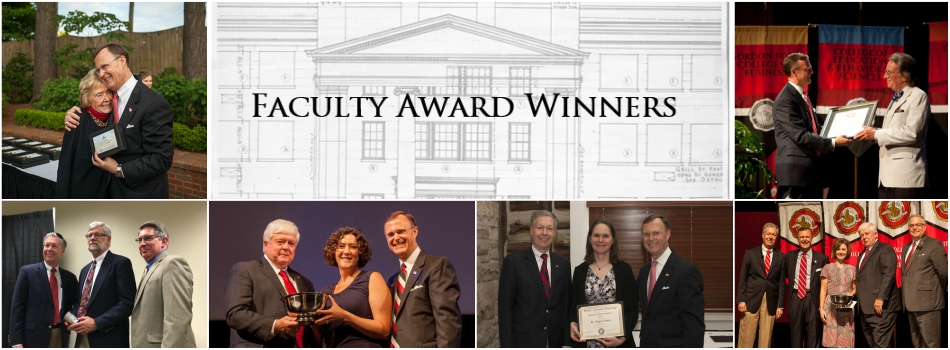
University and Potter College Faculty Awards
Faculty awards are given for excellence in the fields of teaching, research and creativity, public service, and student advisement. The college winners of each award are considered for the university-wide awards, and one overall winner in each category is chosen. The WKU Alumni Association makes a cash award to each recipient of the university-wide awards and the university provides an engraved silver bowl to each. The award winners are recognized annually at an appropriate ceremony. Criteria for the four categories are as follows:
Teaching: This award is given in recognition of the recipient's teaching excellence, as evidenced by effectiveness and ability to motivate and inspire students in the classroom and outside the classroom.
Research/Creativity: This award is given for outstanding contributions in a field of specialty. The recipient of the award will be selected for significant contributions in the field of (1) basic or applied research, (2) creative production, or (3) other scholarly achievements.
Public Service: This award is given to a faculty member for distinguished activity in public service. Categories of public service that are encompassed include technical assistance services; consultation activities; service to public and professional organizations; cultural and artistic services; special services to individual clients; and application of knowledge to the resolution of public problems.
Student Advisement: This award is given to a faculty member in recognition of excellence in advising, as evidenced by extensive and effective support of student development in school and broader life contexts.
Additionally, WKU began presenting two new university-wide awards in 2016. These are for recognition of excellence in faculty mentoring and undergraduate mentoring. The award winners are recognized annually at an appropriate ceremony. Criteria for the two new categories are as follows:
Faculty Mentoring: This award is intended to recognize excellence in mentorship of junior faculty.
Undergraduate Mentoring: This award is presented for outstanding work in mentoring undergraduates in research and creative activity.
University Award Winners
16-17: Undergraduate Mentoring, Dr. Jerod Hollyfield
16-17: Faculty Mentoring, Dr. Lloyd Davies
15-16: Undergraduate Mentoring, Prof. Walker Rutledge
15-16: Part-time Instructor, Prof. Laura Houchens
15-16: Faculty Mentoring, Dr. Davil LeNoir (below)
15-16: Student Advisement, Dr. David LeNoir
14-15: Teaching, Dr. Alison Langdon
10-11: Teaching, Dr. Fabian Alvarez
08-09: Teaching, Dr. Sandra Hughes
99-00: Teaching, Dr. Karen Schneider
93-93: Public Service, Ms. Catherine Ward
89-90: Teaching, Dr. John Hagaman
86-87: Public Service,Ms. Mary Ellen Miller
84-85: Public Service, Dr. James Flynn
76-77: Teaching, Dr. William E. McMahon
68-69: Research, Dr. Mary Washington Clarke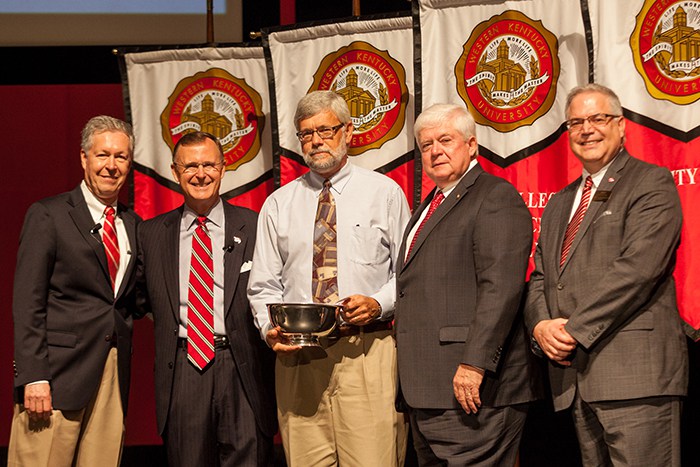
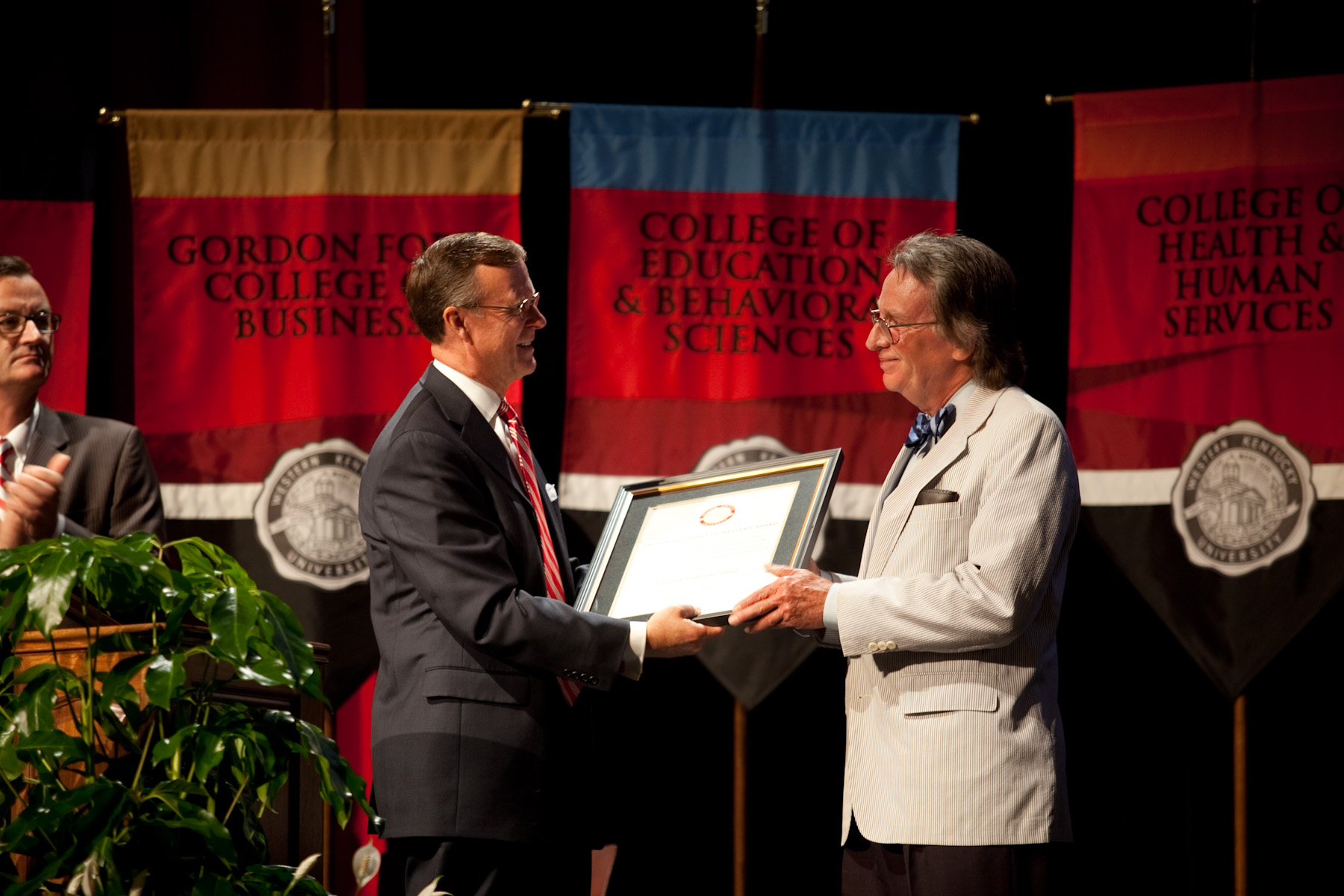
Potter College Award Winners
21-22: Teaching, Dr. Trini Stickle
19-20:Teaching, Dr. John Conley
18-19:Part-time instructor, Dr. Dawn Winters
15-16: Part-time Instructor, Prof. Laura Houchens
15-16: Student Advisement, Dr. David LeNoir
14-15: Teaching Award, Dr. Alison Langdon
12-13: Public Service, Dr. Angela Jones
11-12: Research/Creativity, Dr. David Bell
11-12: Part-time teaching, Dr. Dawn Winters
10-11: Teaching, Dr. Fabian Alvarez
10-11: Research/Creativity, Dr. Deborah Logan
08-09: Teaching, Dr. Sandra Hughes
07-08: Teaching, Dr. Ted Hovet
07-08: Research/Creativity, Dr. Tom Hunley
05-06: Research/Creativity, Dr. Deborah Logan
03-04: Public Service, Dr. Elizabeth Oakes
03-04: Public Service,Dr. Jane Olmsted
00-01: Research/Creativity, Dr. Deborah Logan
99-00: Teaching, Dr. Karen Schneider
98-99: Public Service, Dr. James Flynn
95-96: Teaching, Dr. Brenda Martin
94-95: Teaching, Prof. Walker Rutledge
93-93: Public Service, Dr. Catherine Ward
88-89: Public Service, Dr. Catherine Ward
87-88: Teaching, Dr. Wanella Huddleston
86-87: Teaching, Dr. Brenda Martin
86-87: Research/Creativity, Dr. Frank Steele
84-85: Teaching, Prof. Mary Ellen Miller
83-84: Public Service, Prof. Alice Rowe
81-82: Research/Creativity, Drs. Catherine and Robert Ward
81-82: Public Service, Prof. Tom Jones
See more details about Potter College and University faculty awards.
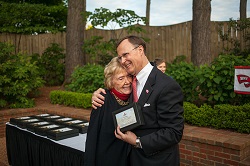 President's Spirit of Western Award
President's Spirit of Western Award
The President's Spirit of Western Award is presented for exemplary leadership and achievement in representing the vivacity, enthusiasm, loyalty, and inspirational principles of the WKU experience.
19-20: Prof. Fabián Álvarez (below)
09-10: Prof. Walker Rutledge (above)
07-08: Prof. Mary Ellen Miller (right)
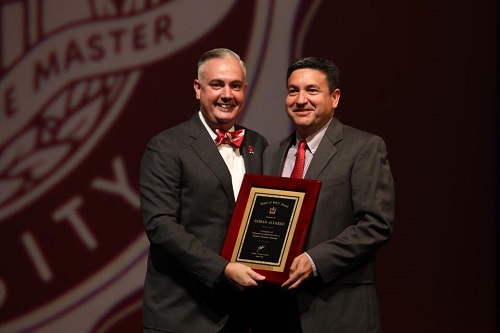
English Department Professorship Award Winners
Despite the English faculty's heavy teaching and essay-grading loads, our professors
have impressive and substantial scholarly and creative records of accomplishment.
Support for such activity has come not only from sabbaticals and special assignments,
but also from donors who have recognized the need for faculty to continue to expand
their expertise in the field. In 1994 the first Wood Professorship, established by
a bequest from Dr. Willson Wood, was awarded to Frank Steele—the Wood Professorship
supports "worthwhile research, writing for publication, or engaging in some other
scholarly activity." In 2001, Lloyd Davies was named the first Traditions Professor,
an award established by an anonymous donor to support scholarship leading to excellence
in teaching the literary canon.
Wood Professorship
22-23: Nancy Dinan received the award to complete research and drafting of two interrelated novel projects.
Dr. Dinan will use the resources from the award to complete two paired novels: one
a nearlyfinished draft and the other in development. These two projects will work
in tandem: one, Tomorrow at Dawn, a novel about a character who is coming to terms with the circumstances of her life,
and two, Under World, a novel written by the main character of the first novel. The project serves as
both a bildungsroman and as a piece of evidence for that coming of age. One of the
goals of this project is to examine the myriad ways an event in a normal life can
be viewed as
magical, and the ways in which an event can be viewed through multiple lenses. In
addition, the project explores the many identities contained within a single person
– all of the possibilities that feel limited by the existence of only a single lifetime.
Ultimately, this project is about the ways in which we as humans are connected, and
the ways in which we continue to influence others, long after we are gone.
21-22: Dr. Kelly Reames received the award to complete a bookmanuscript with Dr. Kristi Branham entitled
Navigating Women's Friendships in American Literature and Culture and to co-edit The Bloomsbury Handbook to Toni Morrison with Dr. Linda Wagner Martin. Dr. Reames used the remainder of the award period to
develop a project on conceptions of the body in feminist literature and literay cricicism.
20-21: Dr. Cheryl Hopson received the award to complete a bookmanuscript entitled Zora Neale Hurston: A Literary Biography. Taking as its central focus the life, writing, and past and present influences of
one of America's an African America's leading authors of the twentieth century. The
book primarily focuses on the twenty-year period between 1925 and 1945, a rich and
productive period for Hurston, in which she published novels, an autobiography, folklore
collections, short stories, essays, and editorials.
19-20: Professor Jessica Folk was able to continue her research on her book-in-progress, which garnered interest from a junior agent at William Morris Endeavor (WME), a major entertainment agency in New York City. An adaptation of Lewis Carroll's Alice in Wonderland, this young adult novel explores what happens when one combines Carroll's fantasy with New Orleans voodoo in 2019 America. Folk seeks to present a fresh take on a popular classic and showcase many non-white characters with varied sexual preferences and gender identities in this classic coming-of-age tale.
18-19: Dr. Jeffrey Rice was able to conduct research abroad in Athens, Greece.
17-18: Dr. Gillian Knoll received the award to support the publication of her book, Conceiving Desire: Metaphor, Cognition, and Eros in Lyly and Shakespeare, which explores the role of the mind in creating erotic experience on the early modern English stage. Grounded in cognitive theories about the metaphorical nature of thought, the book analyzes three basic conceptual metaphors—motion, space, and creativity—that shape erotic desire in plays by William Shakespeare and John Lyly. Her work provides a literary and linguistic analysis of metaphor that credits the role of cognition in the experience of erotic desire, even of pleasure itself. It is part of the series “Edinburgh Critical Studies in Shakespeare and Philosophy.”
16-17: Dr. Christopher Lewis conducted a project on contemporary African American LGBT literature. The project
resulted in conference presentations in Columbus and Boston. The award supported a
series of articles and travel to two festivals in which writers and scholars of African
American and/or LGBT literature will discuss their work.
15-16: Dr. Jerod Hollyfield was provided the time to finish his book Framing Empire: Adaptations of Victorian Literature in Hollywood and worked with assistant Ryan Pait. He attended two academic conferences to network
with publishers and potential readers and signed a contract with Edinburgh University
Press for a 2018 release of the book.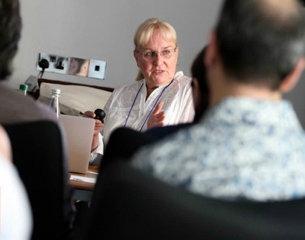
14-15:Dr. Judith Szerdahelyi (right) conducted a project focused on instructor feedback on students’ written assignments. Despite the advantages of audio feedback, the technology used for instructor commentary seems to be predominantly text-based, and she wanted to find out why.
13-14:Dr. Elizabeth Winkler was provided time and funds to pay native speakers of the Kpelle language to work with her in expanding her previous dictionary of the language. A graduate assistant transcribed her notes while she concentrated on other aspects of the dictionary and developed the spelling system for this previously unwritten language.
12-13: Dr. Christopher Ervin was supported in a research project of a small liberal arts writing center in Iowa. The project produced two conference presentations and two article-length manuscripts about (1) peer mentoring culture in a collaborative learning environment and (2) design of academic spaces to facilitate collaborative learning.
11-12:Dr. Alex Poole studied the strategies used by English majors and minors when reading fiction. It provided him the time and resources to pursue an interdisciplinary project based on survey data. As a result, he published two peer-reviewed papers based on his research.
10-11:Dr. Jane Olmsted was aided in writing the biography of her uncle. A research assistant helped her transcribe hundreds of WWII-era letters, about 2 million words, between her uncle and family. She was provided the time to get all the material into a format that she could then edit.
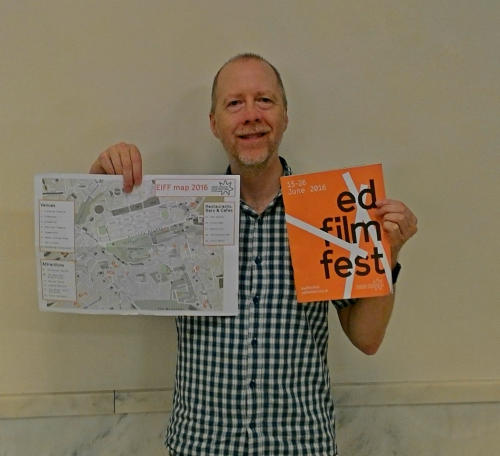 09-10:Dr. Ted Hovet (left), after completing a great deal of primary research in film libraries in the US and
the UK, was provided time and the help of a graduate assistant to organize that material
and read through piles of books, photocopies, and notes. In 2017, he used one of these
files for an article expected to be published in the journal Film History.
09-10:Dr. Ted Hovet (left), after completing a great deal of primary research in film libraries in the US and
the UK, was provided time and the help of a graduate assistant to organize that material
and read through piles of books, photocopies, and notes. In 2017, he used one of these
files for an article expected to be published in the journal Film History.
08-09:Dr. Jane Fife conducted a study of college students who had found publics for their writing beyond the classroom including newspapers, blogs, academic conferences, poetry slams, or campus activism. This study included 40 interviews with these writers about what motivated them to write for a public audience.
07-08:Dr. Judith Szerdahelyi conducted a project called “Online Students’ Learning Preferences in Multimedia-Rich Writing Courses.” She was working on the assumption that online students have a better overall learning experience in a multimedia-enriched environment.
06-07: Dr. Deborah Logan was able to do much research and work on Harriet Martineau.
05-06:Dr. Kelly Reames was enabled to go to the Ransom Center at the University of Texas, which houses Lillian Hellman’s papers. She also worked on revising her dissertation for book publication.
04-05:Dr. Tom Hunley completed his first book of scholarly prose called Teaching Poetry Writing: A Five Canon-Approach published by Multilingual Matters LTD. in 2007. He was aided by graduate assistant Cystal Fodrey, now an assistant professor at Moravian College
03-04:Dr. Lloyd Davies was provided resources and time to work on "Romantic Hebraism: A Covenantal Reading of English Romanticism."
02-03: Dr. Deborah Logan was provided resources and time to pursue research and creative activity. More information forthcoming.
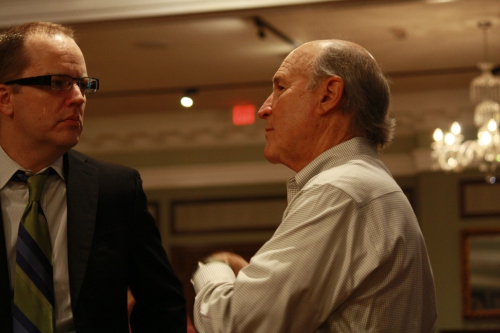 01-02:Dr. Joe Survant (left) was aided in trying to finish two books at the time, The Presence of Snow in the Tropics, published in Singapore by Landmark Books in 2002, and Rafting Rise, published by the University Press of Florida in 2002.
01-02:Dr. Joe Survant (left) was aided in trying to finish two books at the time, The Presence of Snow in the Tropics, published in Singapore by Landmark Books in 2002, and Rafting Rise, published by the University Press of Florida in 2002.
00-01:Dr. Deborah Logan was provided resources and time to pursue research and creative activity. More information forthcoming.
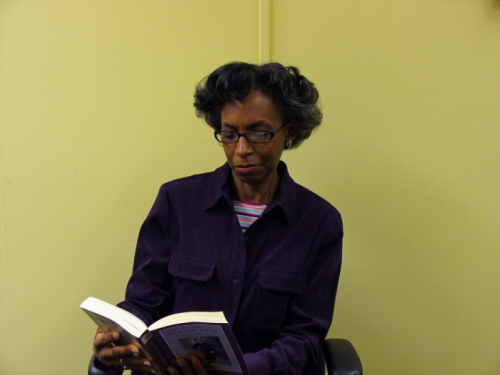 99-00:Dr. Lou-Ann Crouther (right) was provided time and an assistant to continue research about Dorothy Lee Dickens, a little-known American writer. The information
gathered led to correspondence with Dickens's family, and a visit with them in the
summer of 2001. The results of that visit were an article and several presentations
at national conferences.
99-00:Dr. Lou-Ann Crouther (right) was provided time and an assistant to continue research about Dorothy Lee Dickens, a little-known American writer. The information
gathered led to correspondence with Dickens's family, and a visit with them in the
summer of 2001. The results of that visit were an article and several presentations
at national conferences.
98-99:Dr. Elizabeth Oakes was able to research and write a paper on Shakespeare.
96-97: Dr. Joe Millichap began work on a research project involving his long-time interests in railroads and in southern literature. The project eventuated in his sixth book, Dixie Limited: Railroads, Culture, and the Southern Renaissance published by the University of Kentucky Press in 2002.
95-96: Dr. Lesa Dill was provided resources and time to pursue research and creative activity. More information forthcoming.
94-95:Dr. Joe Survant completed a book he was working on, Anne & Alpheus. 1842-1882. It later won the Arkansas Poetry Award and was published by the University of Arkansas Press in 1996.
93-94: Dr. Frank Steele completed Quiet Music, which is a poetry anthology on several years' worth of the poetry journal Plainsong, and The Valley Beneath Words, which is a teaching anthology, complete with apparatus.
Traditions Professorship
22-23: Dr. Gillian Knoll awarded for her Shakespeare Uncovered class documentary project.
18-19: Dr. Lloyd Davies was able to devote research to focus on classic canonical texts from the Romantic period to demonstrate why and how they constitute part of the traditional canon.
17-18: Dr. Niko Endres incorporated more world literature into English 385.
16-17:Dr. Gillian Knoll developed a final project for her class, in which student groups created an episode webpage based on the performance history of a Shakespeare play. The project was to contextualize Shakespeare by studying a mix of scholarly and artistic perspectives, getting a better idea of the overarching narrative of his works, and looking at the performance conditions and histories of the plays. The episodes were created for the PBS documentary series Shakespeare Uncovered .
15-16:Dr. Lloyd Davieswas provided resources and time to work on “The Bible and the Literary Canon.”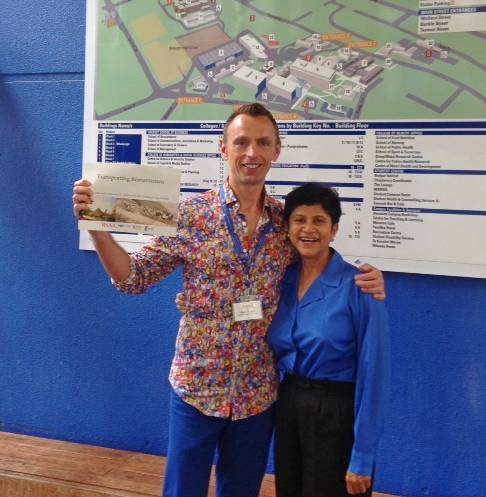
14-15:Dr. Niko Endres (right) developed a new course, Classical Literature, which is being added to the English curriculum.
13-14:Dr. Sandra Hughes was able to do research on an article linking Poe's "The Pit and the Pendulum" and the contemporary film Saw, and to develop a class on Adapting Poe--that is, talking about how Poe's works have been adapted and interpreted by novelists, poets, musicians, film makers, painters, and graphic artists.
12-13:Dr. Alison Langdon continued research on the relegation of the female hero to the background of many canonical texts. One text that offers students fertile ground to explore these issues is the 9th-century poem Genesis B, a 615-line interpolation within the much longer Genesis A. Her research led to the publication of “Teaching Genesis B in the British Literature Survey” in The Old English Newsletter 45.3.
11-12:Dr. Lloyd Davieswas provided resources and time to work on “The Holocaust and its Impact on the Traditional Teaching of Literature.”
10-11:Dr. Niko Endres worked on the classical background to American literature, which he incorporated into a Mythology class.
09-10:Dr. Wes Berry planned a course on American writers who went to France. He proposed this as a potential
study abroad course. While he never taught the class abroad, he turned this study
into his first graduate class, which focused on "Regionalism & Cosmopolitanism" in
modern American literature.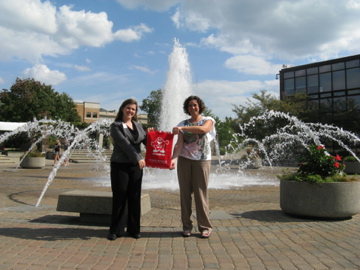
08-09:Dr. Alison Langdon (left) researched Maria Edgeworth's The Modern Griselda which both responds to and radically re-envisions Chaucer’s “Clerk’s Tale” within the context of marriage in Edgeworth’s own contemporary society. Her research produced two conference presentations, one at the International Congress on Medieval Studies, and another at the Medieval Association of the Midwest Conference. The latter presentation was revised into an article published in The Year’s Work in Medievalism 27 (2012).
07-08:Dr. Dale Rigby conducted a project on Michel de Montaigne, whereupon he was allowed the essayistic space to begin what would become a long pedagogical essay in part interrogating his opus, “Of the Education of Children,” called “Of Idle Types,” which would be later published in the 25th annual edition of Writing on the Edge.
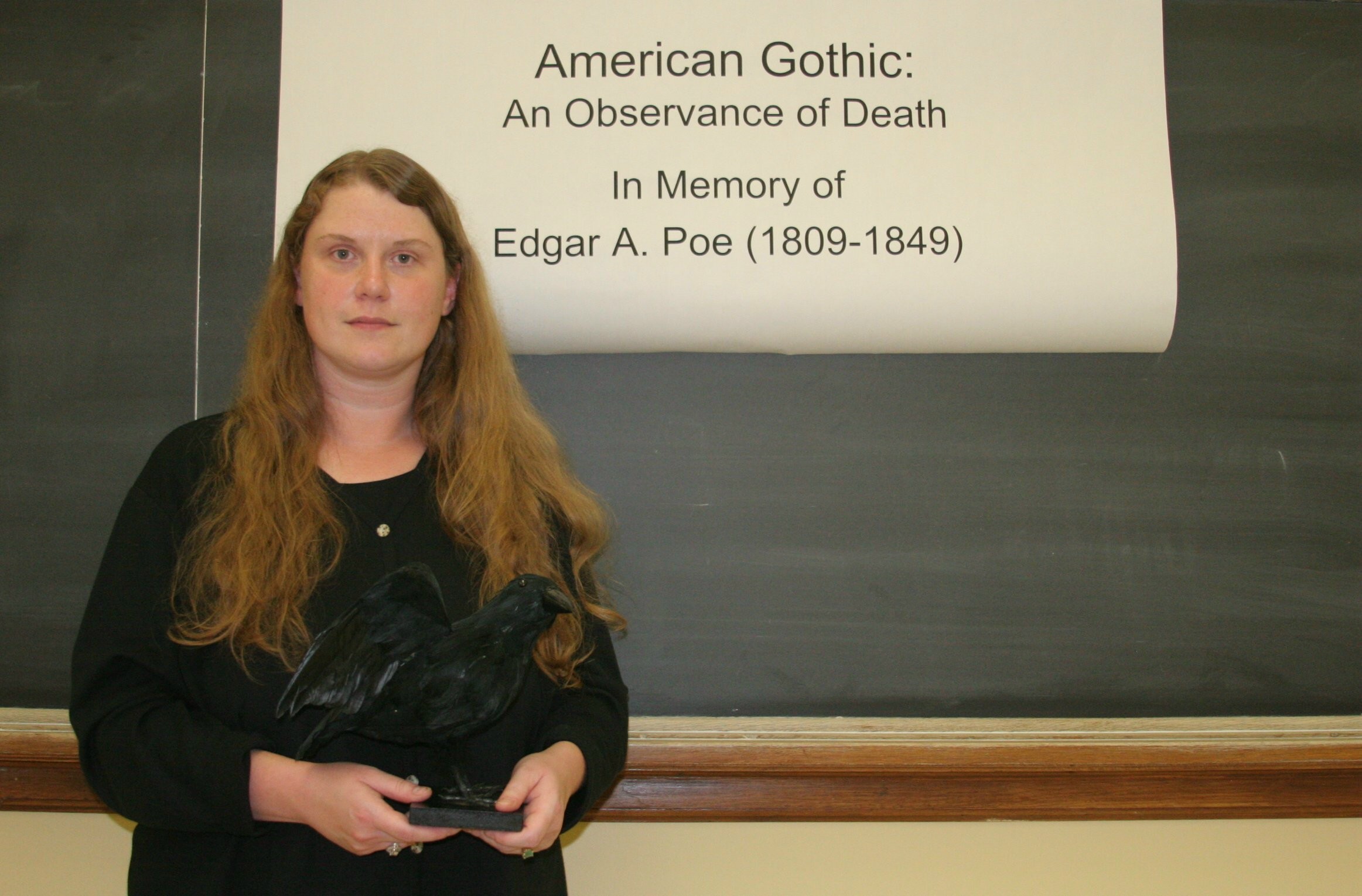 06-07:Dr. Sandra Hughes (right) was provided time and resources to work on two articles that would enhance
her teaching of Hawthorne in survey, upper level, and graduate classes.
06-07:Dr. Sandra Hughes (right) was provided time and resources to work on two articles that would enhance
her teaching of Hawthorne in survey, upper level, and graduate classes.
05-06:Dr. Jim Flynn wrote a critical review of the biographies of Geoffrey Chaucer as a supplement for his courses and to share with others.
04-05:Dr. Niko Endres developed a course in the classical tradition in literature, which he taught as part of the Humanities semester.
03-04:Dr. Karen Schneider would have been provided resources and time to edit an anthology of modern British short stories suitable primarily for use as a textbook but for pleasure reading as well. The project grew out of her frustration with the lack of such an anthology that might be used in a class on Modern British Fiction or a class on the Modern Short Story. Dr. Schneider's award was deferred due to her becoming Department Head the same year.
02-03:Dr. Katherine Greenwas provided resources and time to pursue research and creative activity. More information forthcoming.
01-02:Dr. Elizabeth Oakeswas provided resources and time to pursue research and creative activity on Shakespeare.
00-01:Dr. Lloyd Davies was provided resources and time to work on “Literature and Covenant: Reflections
on the Canon."


